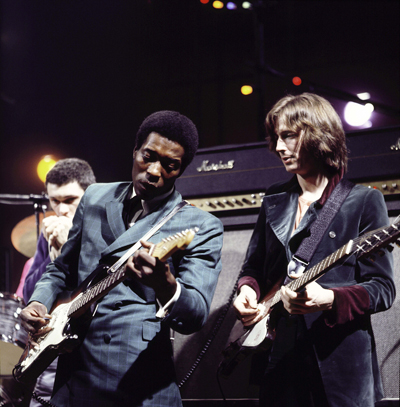
Born and raised in Lettsworth, Louisiana, Guy began learning guitar on a two string diddley bow he made. Later he was given a Harmony acoustic guitar, that, decades later in Guy’s lengthy career was donated to the Rock and Roll Hall of Fame. In the early ’50s he began performing with bands in Baton Rouge. Soon after moving to Chicago in 1957, Guy fell under the influence of Muddy Waters. In 1958, a competition with West Side guitarists Magic Sam and Otis Rush gave Guy a record contract. Soon afterwards he recorded for Cobra Records. He recorded sessions with Junior Wells for Delmark Records under the pseudonym Friendly Chap in 1965 and 1966.
Some are of the opinion that Guy’s early career was held back by numerous parties including recording companies and other established artists. By the late 1960s, Guy’s career was in decline. The heavy blues-rock scene he had helped inspire was flourishing without him. For the next two decades, Buddy Guy had to endure the neglect many blues and rock artists faced in their careers. There are now online videos of Buddy playing with Hendrix in the late 60s. As visionaries and pathfinders they are overlooked while their followers received the fame, recognition and fortune.
Guy’s pathfinding guitar techniques are now recognized as path finding. Loud and aggressive he deployed distortion and feedback techniques for the first time within long solos. Shifts of volume and texture were driven by emotion and impulse. All these lessons were taken up by the new wave of 1960s British artists and later became basic attributes of blues-rock music and its offspring, hard rock and heavy metal music.
Jeff Beck “I didn’t know a Strat could sound like that”
It wasn’t until the late 80s early 90’s that Guy’s career finally took off. Clapton’s request that Guy be part of the ’24 Nights’ all-star blues guitar lineup at London’s Royal Albert Hall was in part responsible for this. Guy performed flamboyant live concerts of energetic blues and blues rock that predated the 1960s blues rockers. As a musician’s musician, he had a fundamental impact on the blues and on rock and roll, influencing a new generation of artists.
“Without Buddy Guy, there would be no Stevie Ray Vaughan.” Guitarist magazine observed:
Stevie Ray Vaughan once declared that Buddy Guy “plays from a place that I’ve never heard anyone play.”
Clapton has stated that he got the idea for a blues-rock power trio while watching Buddy Guy’s trio perform in England in 1965. Eric Clapton said “Buddy Guy was to me what Elvis was for others.” Clapton said in a 1985 Musician magazine article that “Buddy Guy is by far and without a doubt the best guitar player alive…if you see him in person, the way he plays is beyond anyone. Total freedom of spirit, I guess… He really changed the course of rock and roll blues.”
In recognition of Guy’s influence on Hendrix’s career, the Hendrix family invited Buddy Guy to headline all-star casts at several Jimi Hendrix tribute concerts they organized in recent years, “calling on a legend to celebrate a legend.” Jimi Hendrix himself once said that “Heaven is lying at Buddy Guy’s feet while listening to him play guitar.”

